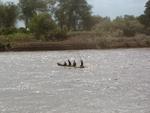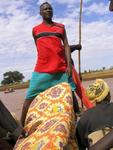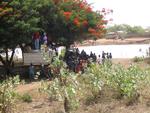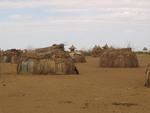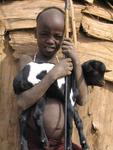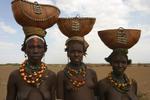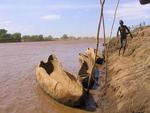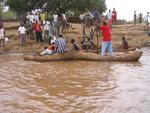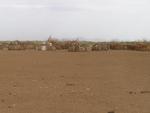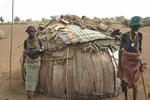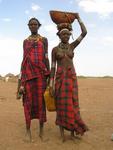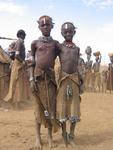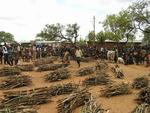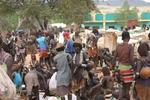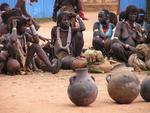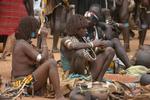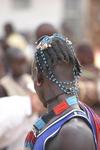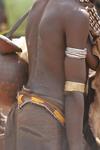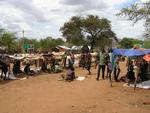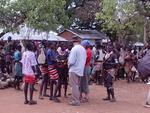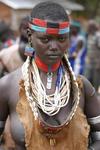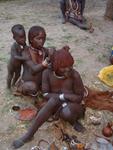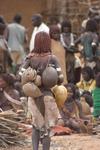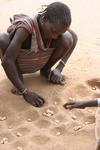After an early morning start we headed further south towards the
Kenyan border and the river Omo. Our destination was the Dasanech
people. The road was a gravel track flanked by large termite
funnels. The air was hot and the journey was quite dull. Occasional
glimpses could be caught of birds or dik-diks.
After an hour and half of driving we reached a police check point.
These seem to be very common. Normally they involve a small hut
and a piece of rope tied across the road at waist height.
Most of the time a driver would signal his approach by honking his
horn and the policeman would just lower the rope to the ground.
Firew warned us that this was a different check point, the police
here have an over inflated sense of importance because of the
proximity to Kenya. We knew that it was possible to cross the
border relatively easy because Ray had done it previously.
Although acting completely disinterested the policeman completed
his duty of taking our resident's ids and glanced at the letter
Firew had from the tourist minister before we could proceed into
the dusty town.
On one side of the Omo was a town, Omorate, much like any
other in the
area it seemed. Huts were made of wood and high wooden fences
surrounded compounds. The huts were large and closer to houses,
not the squat tribal dwellings you might expect. This was the
'western' part of town. People wore little other than the
usual ferenj watching expression. The cars pulled into the
police yard where they would be safe and Firew took us to the
river side. Here we received a lot of attention especially from
young, naked boys, probably about twelve or thirteen years old.
One came up to me to do a little dance and announced that his
name was Michael Jackson. I called him Gertrude and he seemed
happy with this. Due to to his habit of cupping his hand around
his winkie (assuming he was hiding it), Rob called him Genitalia.
The Dasanech village proper was on the other side of the river.
Firew was now bargaining and commanding to get us a boat. A
shallow flat bottomed aluminium boat was brought close to the edge
and we stepped in uncertainly. Joining us in the boat were some new
Ethiopian teachers going to their placement. This seemed a rough
deal to say the least.
The Omo is wide and fast moving, the water was a brown colour
but didn't seem too dirty. The children who had been trying
to get our attention earlier had now dived in the river and
were swimming along side the boat or to the other side. This
was a new trick because to be honest I thought that Ethiopians
melted in water based on the hydrophobia I had seen previously.
Once we reached the other side and jumped onto the steep bank
we were lead to the village. The area was extremely dusty and our
feet sunk into the soft ground. Close to the village some
of the people were sitting under the shade of a large tree. Nearly
all of the people here were women. In a bit of a role reversal, the
men are expected to go out and work while the women stay within the
village.
The huts, the village, and even the people seemed to be a bit
lacking. It felt like it was the arse end of nowhere. The kind
of place you would not wish on anyone. This had to be the Slough
of Ethiopia. My thoughts turned to the new teachers again and
I wondered what the government had told them about this place. It
was clear that they were not from close to the village, and
were not as well prepared for the dust as us.
Two young girls had decided that I was the best bet for money and
repeatedly asked for a photo for about fifteen minutes. I didn't
mind them too much and I was used to people holding my hand. The
others found it very funny that they just wouldn't leave me alone.
Even given the attention of these two young girls the people had
not been too pushy. Like many of the people, the girls had
created their own decoration from things such as film
canisters and watch straps. Metal watch straps seemed to be
a popular feature of necklaces of many of the tribes we saw.
The same boat took us back across the river. Instead of using oars,
large sticks were used. The current was very strong and the pilot
seemed to have miscalculated. Although he had taken the boat a long
way up the river against the flow. We still overshot the place
that we boarded by a large margin. One of the teachers was going
back across the river. She was very, very scared by the boat and
flinched each time she felt any water on her.
We returned to the campsite around lunch time and then headed out
to Dimeka, a large Hamer town. This was quite possibly my favourite
people place of the whole trip. As said previously, we liked the
Hamer people they were friendly, independent and possessed a visible
sense of humour. At Dimeka the the regular market was running and
those who wanted to buy things were in bargaining mood.
Hamer women braid their hair and colour it with ochre. They have
tunics of leather that may or may not cover their breasts. They
nearly always have items made of cowry shells. In Dimeka the
colour blue seemed to be very important and much of the jewellry
featured mostly blue and red. Other distinctive features include
large metal armbands that they rub together when dancing and neck
bands to indicate marriage. Some of these have what looks like a
handle protruding from the front.
In the town we were free to take general photos but individual
people had individual prices. This made getting natural photos
very difficult. Rob was a bit of an expert at disappearing
and taking some fantastic shots. Meanwhile Jackie was out
bargaining, buying, and trading. The traders were friendly and
open to honest bargaining. They started high but it didn't
seem that us ferenji were being treated very differently. Even
when there was an argument about how many things were bought we
were able to settle it ourselves and the Hamer woman who said
that we had four rather than three apologised afterwards. We
liked the Hamer.
A bloke thought that he had caught Rob taking his photo and
demanded payment. With the help of Firew and a local policeman
we could should him it was a general photo - this was an
unexpected benefit of using digital cameras.
Close to the market, myself, Alison and Terri had a nice,
relaxed conversation with two Hamer women. There was no
pressure, the Amharic was working well on both sides. They were
interested in us as much as them. It was a nice atmosphere.
Things were relaxed enough that Rob and Daniel had gone off in
search of a Tej bet (bar for a local drink). An attempt was made
to find somewhere to fill up some highland bottles but we were
out of luck. Firew tried many samples but found none that were
worth buying.
Jackie was on top buying form and left the market with a permanent
souvenir - a Hamer arm band, hammered into place. This was to
be joined by more later. She bought other odds and ends to show
her students once she starts teaching again. On their own it's
almost impossible to guess what the neck bands are used for.
